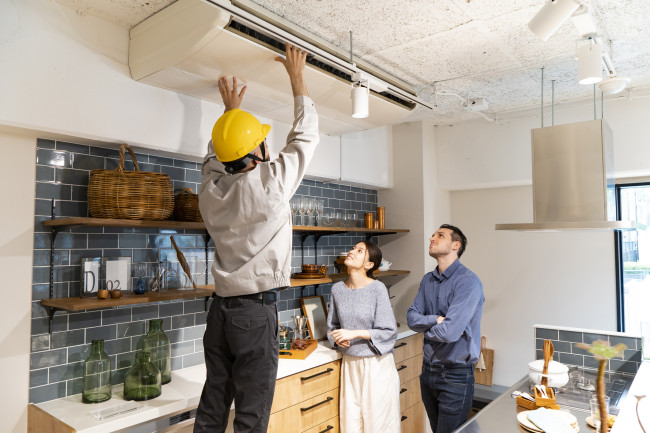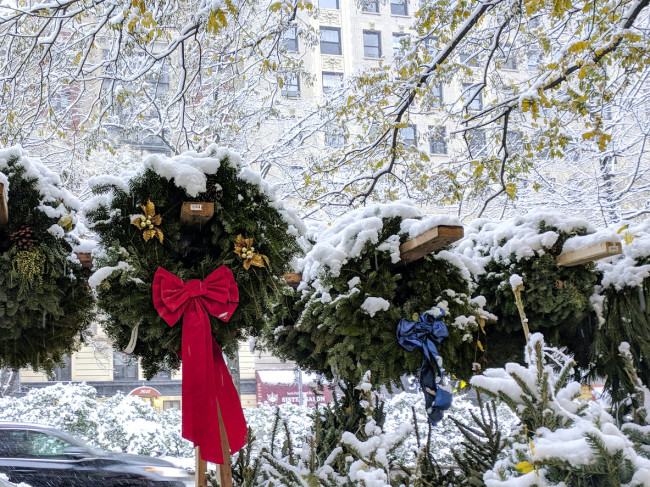What does a NYC building super do? Here's what you can expect
- Buildings with more than nine units are required to have a super
- Supers should be on call for emergencies like a leak or fire
- Pay for a NYC super typically ranges from $30 to $80 an hour

Supers expect to be tipped—$20 for an hour's work is standard—and it goes a long way toward establishing your relationship.
pidjoe/iStock/Getty Images Plus via Getty Images
If you're new to New York City, you may not be familiar with the role a super has in your building. A building super—short for superintendent—is the person who handles garbage removal, cleans common areas, and maintains an apartment building for a landlord.
Supers act as the point of contact to help resolve problems for residents and communicate with the landlord or board and are on staff in co-ops and condos. It's very likely you're going to need help from the super someday, possibly in an emergency, so you need to be able to work with them.
Sometimes that's easier said than done. If your super is simply unfriendly (more on that below) there may not be much you can do about it. If they're not responding to texts when they should, they may be overworked. Keep in mind, supers expect to be tipped—knowing this goes a long way towards establishing your relationship. Major problems like harassment or building neglect should be addressed by the board or property manager.
Is it illegal not to have a super?
The services of a super must be provided to residents of buildings with more than nine apartments. Landlords—or boards—in buildings of this size, must either provide a live-in super or have a super who lives within a block or 200 feet of the building. Alternatively, the tasks can be performed by a janitorial service on a 24-hour basis or by the landlord themselves if they live in the building. This is outlined by the Housing Maintenance Code.
The name of the building owner or super or janitorial services company must be posted in the lobby along with a number for 24-hour contact. Supers typically get rent-free apartments in the building.
Under the Housing Maintenance Code, which applies to buildings with three or more units, apartment buildings must have "adequate janitorial services." So for buildings with three to nine apartments, this means the landlord must provide a number at which they can be reached in emergencies. In NYC a landlord has an obligation under the warranty of habitability to make sure your living conditions aren't dangerous or hazardous. In co-ops, this responsibility falls on the board. For renters, any clause in the lease modifying this right will typically be unenforceable.
The provision of a super in a condo or co-op building will typically be outlined in the governing documents. "The services that a building must provide are typically addressed in the declaration and by-laws, at least on some level," says attorney Steven Kirkpatrick, a partner at Romer Debbas.
How many apartments can a super manage?
According to the NYC Housing Maintenance Code, a super can handle more than 65 apartments only if they are all in the same building. "If that super provides service to two or three adjoining or connected buildings, there would have to be an additional qualifying superintendent covering the other buildings," Kirkpatrick says.
In a single building, a super might be responsible for 20 to 400 units or more depending on the building's size and complexity. Yotam Cohen, co-founder and CEO of building management company Daisy, says larger buildings will have an on-site team that may include one or two handymen.
"The super's experience, availability, and support system play a significant role in determining their capacity," he says.
What can you do about a rude super?
You should have high expectations for the conduct of your super, says Peter Grech, a former super who now teaches courses for building staff at New York City College of Technology. “Supers are in the service industry—they are there to serve people and that includes a kind attitude,” he says.
Even so, supers are human. “If the super has a bad attitude to everyone, someone needs to sit down with them and get to the root cause of it,” Grech says.
This issue came up recently during Brick Underground Office Hours—a live Q&A with tenant attorney Sam Himmelstein, a partner at Himmelstein, McConnell, Gribbin and Joseph (and a Brick Underground sponsor). To find out about our next event subscribe to our newsletter.
Cohen says, a rude or unresponsive super could be the result of a "lack of training or support, and sometimes, they’re not the right fit for the building."
It's the board or the managing agent who would have the authority to discipline or terminate a rude and unresponsive super, says Kirkpatrick.
What if the super is harassing tenants?
In some cases, there’s a fine line between discourtesy and harassment. If the super is found to be harassing tenants, the landlord has little option but to remove them from their position. Kirkpatrick has dealt with these cases in rental buildings and says the Housing Maintenance Code lists the kind of conduct that's considered harassment. It's generally behavior carried out with the intent of pushing someone out of their apartment.
With the passage of the Housing Stability and Tenant Protections Act, anti-harassment provisions in New York were extended to all tenants, not just those in rent-regulated apartments.
“Now anyone can file a harassment case in what is called the HP part in housing court, which is the part that adjudicates HP proceedings to get repairs done,” Himmelstein says.
Is a super expected to answer calls or texts at the weekend?
The availability of a super will often come down to what they are being paid, Grech says. Pay for a super typically ranges from $30 to $80 an hour with a low-end pay being $20 an hour. So, should they be responding to texts and calls on the weekend? "For a live-in super with above-scale pay the answer is yes," he says.
"When it comes to weekends, if it is not an emergency, you should not bother him," he says.
So while it's understood supers are on call for emergencies, it's important to establish what constitutes an emergency: A major water leak, lost power, fire, the smell of gas, or being locked out—all these fall in that category. A dripping faucet, a dead lightbulb, or an interior door that's stuck usually don't require the same urgency.
Yes, supers are expected to be available 24/7 but reaching them during normal weekday business hours is polite.
More and more buildings are making use of technology to support a super's workload. "We believe supers should have their personal time respected," Cohen says. He points out residents communicate with Daisy directly through an app, and the management team works with the supers to ensure the work gets done. "In case of emergencies, Daisy will notify the super and ensure the issue is resolved promptly," Cohen says.
How can I improve my relationship with the super?
One word: Tip. "Doorman and supers will keep track of the better tippers and no tippers," Grech says. If you ask the super to fix a broken cabinet and they spend an hour doing the work, they'll expect a tip. "A tip always goes a long way and I’m not talking $3. If it’s an hour, $20 is nice," he says.
If you can afford it and you have the super in your apartment fixing things for half a day, and don't tip or roll it into a $100 holiday tip, it won't go down well. "It's insulting," Grech says.
Supers know who can afford tips and who can't. Grech remembers a woman who would give $20 in coupons to the super. "We understand that not everyone’s in a position to tip, especially now with inflation, but a super can judge that," he says.
Also, if the super comes to your apartment to fix a leaking faucet and you then add three more items to the to-do list, that's not going to help your relationship. Grech's advice: "If you’ve got five or six things to do, give the super a list so they can be prepared." They need to manage their time and resources and if a quick job in your apartment becomes an afternoon's work, other residents expecting help may not be able to get it.
You Might Also Like



























